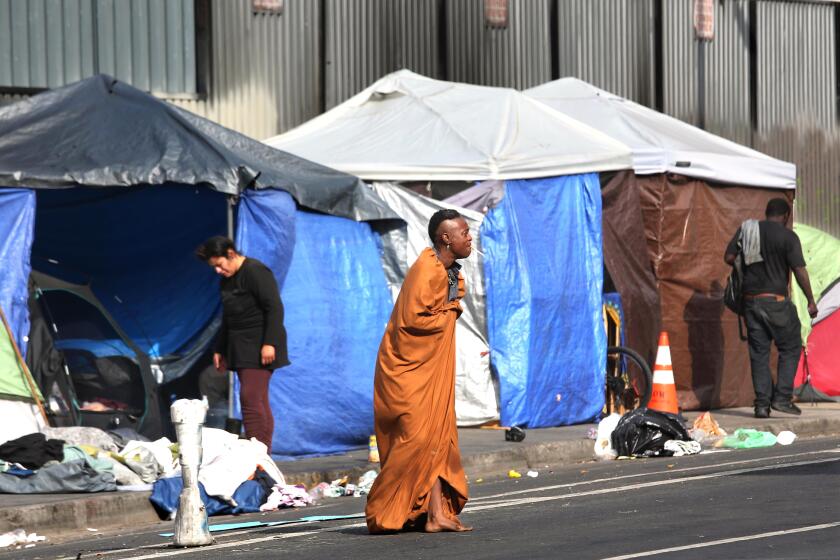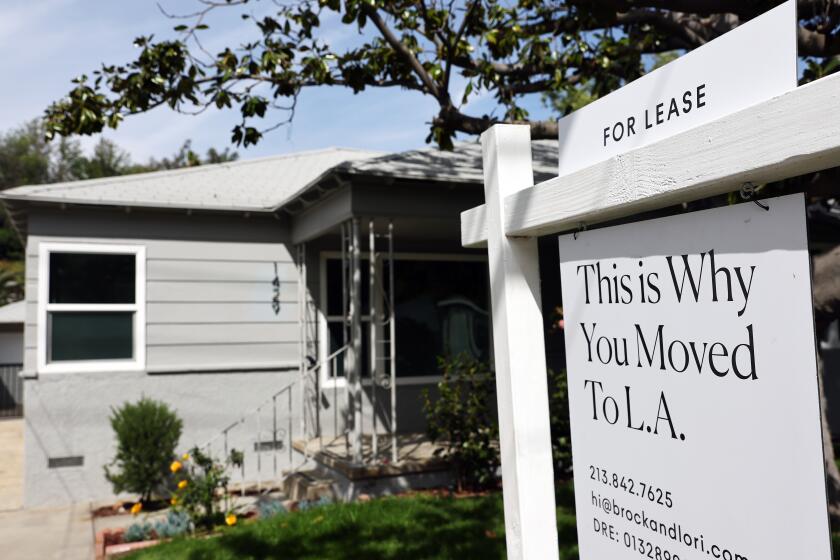Group Gives Needy Homes--and Hope : Refuge: Interfaith Shelter Network brings together area churches in an effort to take homeless families off the street and give them a chance at a new life.
Although city shelters and soup lines are part of the dismal picture many homeless San Diegans will confront this year, one homeless family Wednesday began to escape that dreary scenario.
They moved into a three-bedroom, two-bath house near 47th Street and Hilltop Drive in Southeast San Diego as part of a program sponsored by the Interfaith Shelter Network, an organization of 120 church congregations that helps provide homeless families with shelter.
But while this family of six will now have a roof over its head and a chance to get on its feet, the plight of San Diego’s homeless population is perhaps dimmer than ever.
Frank Landerville, project director for the Regional Task Force on the Homeless, said the area’s homeless population grew last year by roughly 15% to 20%. “In terms of the urban homeless population, there are about 6,000 countywide, approximately 60% of which is estimated to be in the downtown area,” he said.
That’s why groups such as Interfaith are so important, he said.
For the past five years, Interfaith, a program of the San Diego County Ecumenical Conference, has fought the short-term homeless family problem by providing shelter through a different member congregation every two weeks.
The program has attracted attention, including that of President Bush, who on Jan. 9 recognized the group with a “Daily Point of Light” award.
About a year ago, the group embarked on a new Wings Transitional Housing program, which involves renting single-family houses from churches and private landlords and putting homeless families in them for up to a year, said Mary Niez, the network’s coordinator.
The new program was created to help families whose housing and other ancillary problems could not be solved by the average three-week stay in the network’s rotational housing program.
“I look at it like this,” a previously homeless woman said in an ISN videotaped interview, who, due to the network’s client confidentiality policies, was identified only as Sue. “If it wasn’t for the shelter or me going to transitional housing, I’d either be in jail, an institution or dead.”
While Interfaith pays the rent, the tenants pay a monthly fee to the network based on the size of their families, Niez said. Sixty percent of the fee covers the cost of counseling services and classes provided to the family. Forty percent is saved for the family for the transitional period when they move out of the house, she said.
A social worker contracted by the network counsels the family’s head of the household on personal skills such as managing a family budget.
The case worker also exposes the family to a myriad of city services intended to, among other things, improve the family’s literacy, education and job skills and, if necessary, reinforce household members’ efforts to remain drug- and alcohol-free, Niez said.
Like Sue, a former crack addict, many of the applicants who come through ISN’s temporary shelters are alcohol and drug abusers, or are without strong family backgrounds.
“In middle-class America, there’s an awful lot of dysfunctional families,” Niez said. “But when you’re lower-income, often if anything goes wrong, you lose your job or some of your income--and you’re out on the street.”
Congregations “adopt” a house, cleaning, renovating and furnishing it on a volunteer basis. The work and adoption fee of $3,000 may be split by as many as three congregations. Families are not required to join the sponsoring church congregations.
Members of the Chollas View United Methodist Church congregation scrambled last Saturday to finish cleaning and repairing the 47th Street house, which the church owns. Eleven church members lined kitchen cabinets, hung drapes, cleaned bathrooms and arranged furniture.
“They’re very excited,” said Colleen Chun, Chollas View’s pastor, of the three congregations that sponsored the house.
“These are people that have given up their spare time and their spare money, which may not be so spare, to help with the problems of the homeless,” she said. “One member said ‘Good heavens, I don’t wash the windows at my own house and here I am washing them at someone else’s.’ ”
Chun’s own daughters, Carrie, 8, and Laurie, 3, raked and swept leaves and debris from the Loquat and Brazilian pepper trees in the home’s back yard.
In addition to the house they get to stay in, the homeless families are supported by caseworkers.
In the videotape, Sue credited her caseworker, Leslee Coleman, for her persistence in persuading her to attend narcotics anonymous meetings and tutoring sessions, which Sue initially found boring.
“I thank Leslee for (my attendance) because she just pushed, pushed, pushed me to go to these meetings, and it was like I was fighting back,” she said.
“This is the favorite part of my job,” Coleman said. “Most caseworkers don’t get a whole year to work with their families.”
A lot of satisfaction comes from having a longer association with her clients, Coleman said. “I’ve seen families go from being on the street to getting jobs, housing and saving money.”
Some of the families get tired of being monitored so often and are anxious to work on their problems by themselves, Niez said. “For instance, (families) may want to work out their budget alone and not with a case manager. Sometimes they’re ready and sometimes they’re not. We generally let them try,” she said.
The program provides as much support as possible, but the homeless families must shoulder much responsibility, Niez added. They make and are accountable for their own decisions.
“We’re not there to pick up the pieces when things fall apart but to analyze why they fell apart and to try to help the family so that maybe things won’t fall apart again,” she said.
Living in a private home can have a profound effect on people who were previously homeless, volunteers say.
Sue lived in Interfaith’s first house, a single-family home in Clairemont owned by St. Mark’s United Methodist Church. “I noticed the kids were much more polite and relaxed after a few months in the house,” said Jim Jenkins, who spearheaded St. Mark’s seven-month cleanup of the house.
“I have to believe,” he said, “that having a place to call home or come home to had a significant effect on the attitude of the children as well as the mother.”
Sign up for Essential California
The most important California stories and recommendations in your inbox every morning.
You may occasionally receive promotional content from the Los Angeles Times.



